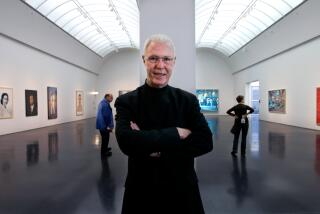BABBITT FESTIVAL
- Share via
Milton Babbitt will be 70 on May 10. In honor of the event, CalArts offered the composer a two-day festival this past weekend.
In terms of musical concentration, this was a marathon. Babbitt’s genial introduction to the first concert Friday night included an apology for the program’s length--five of his own complex pieces, two intermissions, and Schoenberg’s “Pierrot Lunaire.”
A stylistic movement appears in the pontilism of the “Composition for 12 Instruments” (1954), the more rhythmically intricate composite lyricism of the “Arie da Capo” (1974), and the linear combinations of “Four Play” (1984). All use serial techniques, of course, although the structural potential of each work develops organically. But Babbitt’s fascination with timbre appears to culminate in “Four Play.” Very precise instrumental combinations modify the attack and release of each note, not as the mixed sonority of standard orchestration but in the way sound envelopes are manipulated in electronic compositions.
Under Stephen Mosko’s careful direction, ensembles drawn from the CalArts Twentieth Century Players and the California E.A.R. Unit gave cogent, colorful accounts of these pieces.
The declamatory “Composition for Guitar” (1984) and wistful “Melismata” for solo violin (1982) proved surprisingly conservative in terms of instrumental effects. Tremolos and a regimented dynamic scheme characterize the former, fingered harmonics and ponticello effects the latter. Guitarist Stuart Fox and violinist Yoko Matsuda played them with quiet virtuosity.
More to Read
The biggest entertainment stories
Get our big stories about Hollywood, film, television, music, arts, culture and more right in your inbox as soon as they publish.
You may occasionally receive promotional content from the Los Angeles Times.










